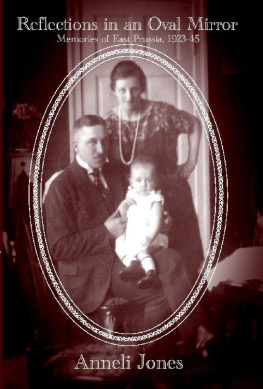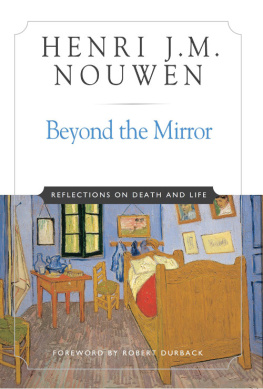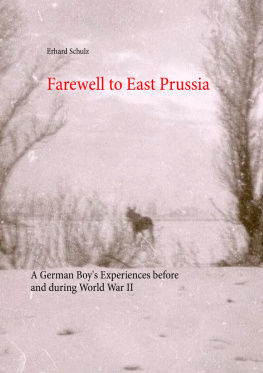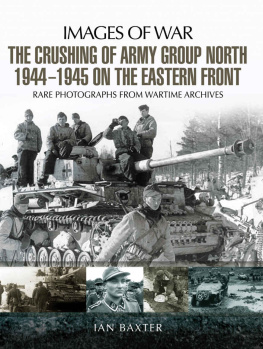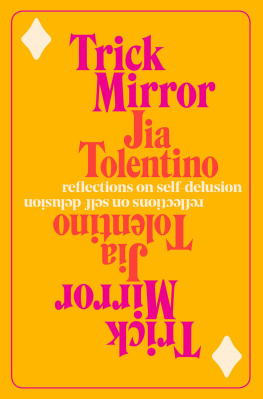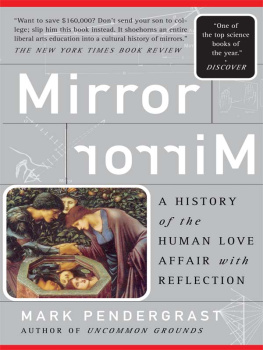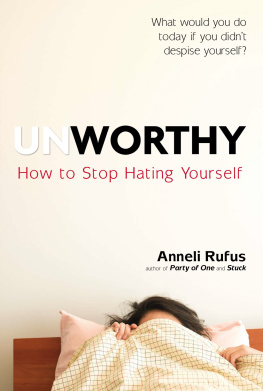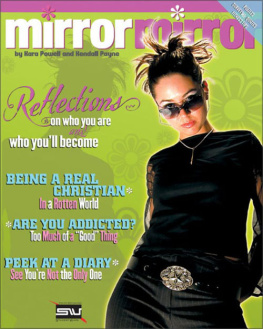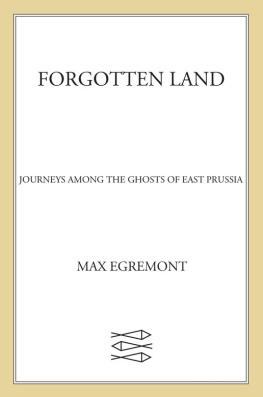Anneli Jones - Reflections in an Oval Mirror: Memories of East Prussia 1923-1945
Here you can read online Anneli Jones - Reflections in an Oval Mirror: Memories of East Prussia 1923-1945 full text of the book (entire story) in english for free. Download pdf and epub, get meaning, cover and reviews about this ebook. year: 2017, publisher: Ozaru Books, genre: Non-fiction. Description of the work, (preface) as well as reviews are available. Best literature library LitArk.com created for fans of good reading and offers a wide selection of genres:
Romance novel
Science fiction
Adventure
Detective
Science
History
Home and family
Prose
Art
Politics
Computer
Non-fiction
Religion
Business
Children
Humor
Choose a favorite category and find really read worthwhile books. Enjoy immersion in the world of imagination, feel the emotions of the characters or learn something new for yourself, make an fascinating discovery.
- Book:Reflections in an Oval Mirror: Memories of East Prussia 1923-1945
- Author:
- Publisher:Ozaru Books
- Genre:
- Year:2017
- Rating:4 / 5
- Favourites:Add to favourites
- Your mark:
- 80
- 1
- 2
- 3
- 4
- 5
Reflections in an Oval Mirror: Memories of East Prussia 1923-1945: summary, description and annotation
We offer to read an annotation, description, summary or preface (depends on what the author of the book "Reflections in an Oval Mirror: Memories of East Prussia 1923-1945" wrote himself). If you haven't found the necessary information about the book — write in the comments, we will try to find it.
Anneli Jones: author's other books
Who wrote Reflections in an Oval Mirror: Memories of East Prussia 1923-1945? Find out the surname, the name of the author of the book and a list of all author's works by series.
Reflections in an Oval Mirror: Memories of East Prussia 1923-1945 — read online for free the complete book (whole text) full work
Below is the text of the book, divided by pages. System saving the place of the last page read, allows you to conveniently read the book "Reflections in an Oval Mirror: Memories of East Prussia 1923-1945" online for free, without having to search again every time where you left off. Put a bookmark, and you can go to the page where you finished reading at any time.
Font size:
Interval:
Bookmark:
Anneli Jones
Reflections in an Oval Mirror
Memories of East Prussia
1923 1945
CONTENTS
ILLUSTRATIONS
You should write all this down was a phrase I kept hearing after the war. I heard it so frequently, I can no longer remember how frequently and from whom I heard it.
But I do remember that I felt extremely inhibited concerning writing anything when I felt that I had no language to write in: the more my English improved, the less capable I felt to write in any language.
I had written articles for the News Guardian, a British army newspaper, and there were fewer and fewer corrections from the assistant editor. Later I also wrote the occasional article for The Observer news service and had my reports printed, mainly in Australian papers.
But I still did not believe that I could write.
Mr E.F. Schumacher, a German-born economist who had lived in the UK for many years and who had been invited by the Berlin Press Club to give a lecture at one of our functions, almost convinced me that it was not necessary to be totally absorbed in one language in order to write; that even he himself, though he had written many books and was giving many lectures, would still count in German up to 20 before he switched into English! So I made a few rather feeble attempts to write some of my experiences on paper.
Robert Stephens and his wife Taqui greatly encouraged me. Taqui herself wrote and published her childhood memories in a book called In Aleppo Once and thought that I should do the same.
But it was not until I felt the need to give some understanding of their roots to my own 5 children, and, moreover, when I discovered that my mother had kept all the letters I ever wrote to her (even though I had urged her to burn the lot) and began to read those, that I seriously began to write all I could recall from memory, from my old letters, from old photo albums and mostly from my own diary which my grandmother had given to me and which had a little lock with a key to stop other people discovering my secrets!
So here it is, mainly as a source of information for my children, but also for myself to indulge in nostalgia. I hope that other people will enjoy meeting my East Prussian family, my animals, my forests.
Die Krhen schrein
Und ziehen schwirren Flugs zur Stadt:
Bald wird es schnein
Wohl dem, der jetzt noch Heimat hat!
Whirring to the town,
Crows screech as they roam:
Soon snow will fall down
Happy are those with a home!
Nietzsche

Dates of birth of relatives mentioned in the text

Map of East Prussia
YEARS OF CAREFREE INNOCENCE: 19231933
My first clear memory is of the full-length mirror in my mothers dressing room. From its ornate oval frame a girl aged two-and-a-half stared back at me in admiration, not for my thin blond curls or my large blue eyes, nor even for the lovely bright tartan dress with a big white collar and red bow, shop-bought by my grandmother Omi, who believed in the quality brand Bleyle rather than the home-grown-spun-woven-knitted garments my father insisted on. What I admired in my reflection was the tray I held ever so carefully with a glass of very hot lemon juice on it. Thereby my newly-acquired status as the big child in the family was confirmed.
Behind me, in my parents bedroom, stood a basket on a stand with a canopy of white curtains sprayed by tiny forget-me-nots which reached all the way down to the floor. The same soft material lined the inside of the cot where my baby brother slept or grunted. Since he had come home from hospital, Mutti, my mother , had often made me stand on tip-toe to look at him, and I quite liked doing so. I had probably seen him at Christmas, but I have only a very vague memory of rustling starched nurses, of a large, polished, chestnut-coloured table next to Muttis bed and a Christmas tree seen through the door of the adjoining room.
Mutti had shown me a photo of when I was as little as my brother Claus now was and a starched nurse lived in the house to look after me. After her I had a nanny whom I called Blum-Blum because of the floral patterns on all her clothes. I still remembered her dresses, but had forgotten her face. I no longer needed a nursemaid: I was a big girl now.
The steam from the lemon juice began to blur the better half of my reflection. Below were crinkled stockings and lace-up boots; these had no part in my moment of bliss, but were a constant and constantly irritating image for many winters to come, winters of itchy legs, of vain attempts to pull the stockings tight and, worse, of growing frustration with manoeuvring laces through eyelets, worst of all when the metal bits at the ends of the laces had come off. Why, oh why, I wondered angrily, did girls fashion dictate eyelets when boys boots had simple hooks? And why indeed should my dear mother and Omi, my grandmother, conform to fashion for children?
But footwear apart, my Omi was wonderful, and I was very proud to serve her with hot lemon juice. She had overcome her usual reluctance to leave her own farm only because she wanted to help Mutti with the baby; and now Omi found herself confined to the spare bed in the dressing room with 'flu. Small as I was, I could feel her depression and homesickness, because I thought of her Alischken as paradise.
Alischken, where my mother had grown up, was smaller than our farm in Mikalbude. It was attached to a village of the same name. Omi lived there with her mother, my great-grandmother Omut and, until his wife inherited a farm of her own, my uncle Arnold and his family. When he left, Omi ran the farm with the aid of an Inspector, a farmers son who, as a paid overseer on someone elses farm, underwent several years of practical training.
She was only in her forties when I was born, though she always looked very, very old to me. Both Omut and Omi were widows and wore their former husbands wedding rings soldered to their own. Both wore mourning clothes, black dresses, black aprons, black stockings, black shoes. Only on Sundays and at birthday parties was the black relieved by white lace fichus pinned to the neckline, Omuts being the more frilly and elaborately embroidered of the two, while Omi wore a more decorative gold brooch to hold hers in place.

A few months old
Mutti always thought this showed my Eve-like nature. I myself felt it was closer to the Hamlet misquote Vanity, thy name is woman!
My great-grandfather had died from a sudden heart attack in 1885 after a bankruptcy shock. At that time Omi was not yet eleven and her sister Antonie only eight years old. The latter, whom I knew as Aunt Toni and greatly loved, later married the widower Karl Krumm, who had a daughter called Ruth, whom I hated. Not that I was particularly fond of Uncle Karl either; he was an intelligent civil servant at the Ministry of Finance in Gumbinnen and an ardent Social Democrat, which made him unpopular with our adult relations; his equally ardent belief that children must be seen but not heard made the younger generation fearful of him. I resented the way he allowed his stupid yellow canary to jabber incessantly while prohibiting childrens comments on adult conversation.
Omi herself had also married a widower, whose son, our pleasant Uncle Hans, lived on a farm called Gendrinnen with his wife and two boys. A framed photograph of my grandfather hung above Omis bed, below an embroidered picture of Christ, which had the words ECCE HOMO written in gold thread. I felt sad never to have seen the gorgeous bushy beard and the kind, smiling eyes of Muttis father in real life. He had died in 1918, a few weeks before the War ended, quite suddenly and unexpectedly. The postman had brought news in the morning that their elder son Kurt had been killed in what turned out to have been the last battle of that war. My grandfather rode to the fields as usual, talked to his workmen and fell dead from his horse.
Font size:
Interval:
Bookmark:
Similar books «Reflections in an Oval Mirror: Memories of East Prussia 1923-1945»
Look at similar books to Reflections in an Oval Mirror: Memories of East Prussia 1923-1945. We have selected literature similar in name and meaning in the hope of providing readers with more options to find new, interesting, not yet read works.
Discussion, reviews of the book Reflections in an Oval Mirror: Memories of East Prussia 1923-1945 and just readers' own opinions. Leave your comments, write what you think about the work, its meaning or the main characters. Specify what exactly you liked and what you didn't like, and why you think so.

